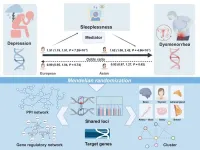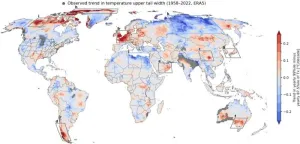(Press-News.org) Men with cardiovascular disease risk factors, including obesity, face brain health decline a decade earlier—from their mid 50s to mid 70s—than similarly affected women who are most susceptible from their mid 60s to mid 70s, suggest the findings of a long term study, published online in the Journal of Neurology Neurosurgery & Psychiatry.
The most vulnerable regions of the brain are those involved in processing auditory information, aspects of visual perception, emotional processing and memory, with the damaging effects just as evident in those who didn’t carry the high risk APOE ε4 gene as those who did, the findings show.
It’s clear that cardiovascular disease risk factors, such as type 2 diabetes, obesity, high blood pressure, and smoking are associated with a heightened risk of developing dementia.
But when might be the best time to intervene with appropriate treatment to stave off the associated neurodegeneration, and whether this timing might differ between the sexes, isn’t clear, say the researchers.
To explore this further, they drew on 34,425 participants of the UK Biobank all of whom had had both abdominal and brain scans. Their average age was 63, but ranged from 45 to 82.
Cardiovascular disease risk was assessed using the Framingham Risk Score, which is based on: age; blood fats; systolic blood pressure—the maximum arterial pressure exerted when the heart contracts and pumps blood, and represented by the first higher number in a reading—blood pressure medication; smoking; and diabetes.
Additionally, changes in brain structure and volume were recorded using a neuroimaging technique called Voxel-based morphometry (VBM) to identify the influence of cardiovascular risk, abdominal fat, and the fat that surrounds body organs (visceral adipose tissue) on brain neurodegeneration.
Analysis of the data showed that higher levels of abdominal fat and visceral adipose tissue were associated with lower brain grey matter volume in both men and women.
The strongest influence of cardiovascular risk and obesity on brain neurodegeneration occurred a decade earlier in men than in women and was sustained over two decades, the data revealed. The effects were also stronger in men than they were in women.
Men were most susceptible to the damaging effects between the ages of 55 and 74, while women were most susceptible between the ages of 65 and 74.
High cardiovascular risk and obesity predisposed to gradual loss of brain volume over several decades, occurring in a bell-shaped curve over time, with susceptibility lower at younger (under 55) and older ages (75+), although there were relatively few participants of either sex in these age groups, note the researchers.
Importantly, the associations remained, irrespective of whether or not those affected were carriers of the high risk APOE ε4 gene.
The most vulnerable regions of the brain were the temporal lobes, located in the cerebral cortex, the brain’s outer surface. These regions are involved in aural, visual, and emotional information processing, and memory—regions affected early on in the development of dementia.
“The detrimental impact of cardiovascular risk was widespread throughout cortical regions, highlighting how cardiovascular risk can impair a range of cognitive functions,” note the researchers.
“Therefore, modifiable cardiovascular risk factors, including obesity, deserve special attention in the treatment/prevention of neurodegenerative diseases, including Alzheimer’s disease,” they add.
“This highlights the importance of aggressively targeting cardiovascular risk factors before the age of 55 years to prevent neurodegeneration and Alzheimer’s disease, in addition to the benefit of preventing other cardiovascular events, such as myocardial infarction [heart attack] and stroke,” they emphasise.
“One such possibility may be in the repurposing of agents used for obesity and type 2 diabetes mellitus for the treatment of Alzheimer’s disease,” they suggest, adding that other drugs used for the treatment of cardiovascular disease have also shown promise.
This is an observational study, so no firm conclusions can be drawn about cause and effect. And the researchers acknowledge various limitations to their findings, including that the UK Biobank didn’t record specific biomarkers for Alzheimer’s disease.
Atrophy of frontal, parietal, and temporal brain regions is also typical of normal ageing, making it difficult to precisely differentiate between the impact of cardiovascular risk on general ageing processes and the risk of specific neurodegenerative conditions, they add.
But there are plausible biological explanations for the observed neuronal damage, they explain. These include inflammation, central leptin and insulin resistance, as well as the breakdown of the blood-brain barrier.
And they conclude: “Targeting cardiovascular risk and obesity a decade earlier in males than females may be imperative for potential candidates to achieve a therapeutic benefit in preventing neurodegeneration and cognitive decline.”
END
Men at high risk of cardiovascular disease face brain health decline 10 years earlier than women
Most vulnerable regions those involved in aural, visual + emotional processing, and memory. Findings observed both in those who did and didn’t carry high risk APOE ε4 gene
2024-11-27
ELSE PRESS RELEASES FROM THIS DATE:
Irregular sleep-wake cycle linked to heightened risk of major cardiovascular events
2024-11-27
An irregular sleep-wake cycle is associated with a heightened risk of major cardiovascular events, such as heart attack and stroke, even for those who clock up the recommended nightly hours of shut-eye, finds research published online in the Journal of Epidemiology & Community Health.
Most studies looking at the impact of sleep on health have focused on sleep length and less is known about the impact of sleep patterns, in particular the impact of irregular sleep—defined as variations in the time a person goes to sleep and wakes up.
To explore this further, the researchers drew on 72,269 people aged 40 to 79, taking part in the UK ...
Depression can cause period pain, new study suggests
2024-11-27
Women are twice as likely as men to suffer from depression and often experience more severe physical symptoms. This gender difference is particularly evident during reproductive years and dramatically impacts the lives of hundreds of millions of people worldwide. However, although links between mental health and reproductive health have been found, the associations have remained underexplored.
In a new study published in Briefings in Bioinformatics, researchers from China and the UK have found that depression can increase the chances of a person experiencing menstrual pain (dysmenorrhea).
Shuhe Liu, lead author of the study and a PhD ...
Wistar Institute scientists identify important factor in neural development
2024-11-26
PHILADELPHIA — (Nov. 26, 2024) — The Wistar Institute’s Alessandro Gardini, Ph.D., and lab have shed new light on how certain biological processes determine the development of neural cells. Their findings on a molecular “bridge” complex demonstrate a new level of detail in the understanding of early neural development — which is fundamental for the further understanding of neurodevelopmental syndromes. The new paper, “The enhancer module of integrator controls cell identity and early neural fate commitment” was published in the journal, Nature Cell Biology.
“By achieving a better understanding of how the nervous system develops ...
New imaging platform developed by Rice researchers revolutionizes 3D visualization of cellular structures
2024-11-26
A team of researchers led by Anna-Karin Gustavsson at Rice University has developed an innovative imaging platform that promises to improve our understanding of cellular structures at the nanoscale. This platform, called soTILT3D for single-objective tilted light sheet with 3D point spread functions (PSFs), offers significant advancements in super-resolution microscopy, enabling fast and precise 3D imaging of multiple cellular structures while the extracellular environment can be controlled and flexibly adjusted. The research was recently published in Nature Communications.
Studying ...
To catch financial rats, a better mousetrap
2024-11-26
Enron. Lehman Brothers. More recently, General Electric and Supermicro. During the past quarter century, a variety of high-profile companies have been caught cooking their books.
But they’re often not caught before they’ve cost investors billions of dollars. That’s why analysts have long tried to sniff out businesses that may be using questionable or flat-out illegal accounting tricks to hide poor performance.
New research from Urooj Khan, accounting professor and the Deloitte & Touche Centennial Faculty Fellow at Texas McCombs, proposes a new and more effective way to gauge companies’ “earnings quality.”
In analyses of corporate ...
Mapping the world's climate danger zones
2024-11-26
With 2024 on track to be declared the hottest on record, scientists from IIASA and Columbia University have noticed that specific regions are consistently more affected by extreme temperatures. A new study provides the first worldwide map of these regional climate danger zones.
Amid the continued upward march in average temperatures over the past decades, a recent surge of record shattering extreme heat waves raise questions about the degree to which climate models can provide adequate estimates of relations between global mean temperature changes and regional climate risks. The study just published in the Proceedings of the National Academy of Sciences (PNAS) provides the ...
Emory heart team implants new blood-pumping device for first time in U.S.
2024-11-26
On Nov. 18, the heart failure and transplantation team at Emory University Hospital (EUH) made history, performing the first-ever surgical implantation in the United States of a brand-new type of ventricular assist device (VAD), which provides crucial care to patients with failing hearts.
An expert team led by veteran cardiothoracic surgeon Mani Daneshmand, MD, successfully implanted a novel magnetically levitated pump, a VAD that has been specifically designed for patient ease and long-term health. The BrioVAD System, made by BrioHealth Solutions Inc., was authorized by the FDA to begin clinical trials ...
Congenital heart defects caused by problems with placenta
2024-11-26
Congenital heart defects are the most common form of human birth defect, but we still don’t fully understand what causes them. Previous research had suggested that some heart defects could be triggered by problems with the placenta, the organ that provides oxygen and nutrients to the developing embryo. Now, researchers at Nanjing University, China have confirmed this link by focusing on a protein whose levels are reduced in many patients with congenital heart defects, called SLC25A1. SLC25A1 plays a key role in transporting ...
Schlechter named Cancer Moonshot Scholar
2024-11-26
Chelsey Schlechter, MPH, PhD, Huntsman Cancer Institute investigator and assistant professor in the Department of Population Health Sciences at the University of Utah (the U), has been selected as a Cancer Moonshot Scholar.
Schlechter is one of only eleven researchers in the U.S. chosen for the prestigious program this year, which aims to both advance impactful cancer research and broaden the research workforce.
For the project, Schlechter and her team partnered with the Association for Utah Community Health and Utah Community Health Centers—organizations which ...
Two-way water transfers can ensure reliability, save money for urban and agricultural users during drought in Western U.S., new study shows
2024-11-26
A new study led by researchers at the University of North Carolina at Chapel Hill offers a solution to water scarcity during droughts amid the tug of economic development, population growth and climate uncertainty for water users in Western U.S. states. The proposed two-way leasing contracts would coordinate agricultural-to-urban leasing during periods of drought and urban-to-agricultural leasing during wet periods, benefiting both urban and agricultural water users.
“Water markets are an important tool for allocating water in the Western U.S., and other water-scarce regions around the world, but they are often slow to respond to drought, ...
LAST 30 PRESS RELEASES:
Novel camel antimicrobial peptides show promise against drug-resistant bacteria
Scientists discover why we know when to stop scratching an itch
A hidden reason inner ear cells die – and what it means for preventing hearing loss
Researchers discover how tuberculosis bacteria use a “stealth” mechanism to evade the immune system
New microscopy technique lets scientists see cells in unprecedented detail and color
Sometimes less is more: Scientists rethink how to pack medicine into tiny delivery capsules
Scientists build low-cost microscope to study living cells in zero gravity
The Biophysical Journal names Denis V. Titov the 2025 Paper of the Year-Early Career Investigator awardee
Scientists show how your body senses cold—and why menthol feels cool
Scientists deliver new molecule for getting DNA into cells
Study reveals insights about brain regions linked to OCD, informing potential treatments
Does ocean saltiness influence El Niño?
2026 Young Investigators: ONR celebrates new talent tackling warfighter challenges
Genetics help explain who gets the ‘telltale tingle’ from music, art and literature
Many Americans misunderstand medical aid in dying laws
Researchers publish landmark infectious disease study in ‘Science’
New NSF award supports innovative role-playing game approach to strengthening research security in academia
Kumar named to ACMA Emerging Leaders Program for 2026
AI language models could transform aquatic environmental risk assessment
New isotope tools reveal hidden pathways reshaping the global nitrogen cycle
Study reveals how antibiotic structure controls removal from water using biochar
Why chronic pain lasts longer in women: Immune cells offer clues
Toxic exposure creates epigenetic disease risk over 20 generations
More time spent on social media linked to steroid use intentions among boys and men
New study suggests a “kick it while it’s down” approach to cancer treatment could improve cure rates
Milken Institute, Ann Theodore Foundation launch new grant to support clinical trial for potential sarcoidosis treatment
New strategies boost effectiveness of CAR-NK therapy against cancer
Study: Adolescent cannabis use linked to doubling risk of psychotic and bipolar disorders
Invisible harms: drug-related deaths spike after hurricanes and tropical storms
Adolescent cannabis use and risk of psychotic, bipolar, depressive, and anxiety disorders
[Press-News.org] Men at high risk of cardiovascular disease face brain health decline 10 years earlier than womenMost vulnerable regions those involved in aural, visual + emotional processing, and memory. Findings observed both in those who did and didn’t carry high risk APOE ε4 gene



